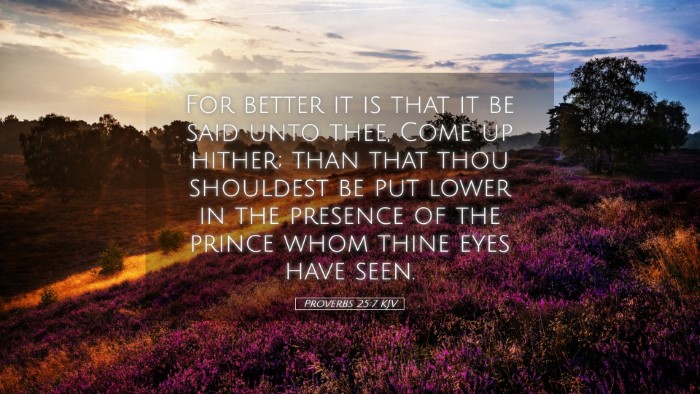Commentary on Proverbs 25:7
Proverbs 25:7: "For better it is that it be said unto thee, Come up hither; than that thou shouldest be put lower in the presence of the prince whom thine eyes have seen."
Introduction
The book of Proverbs encapsulates wisdom and guidance for living a virtuous life.
In Proverbs 25:7, King Solomon emphasizes the importance of humility and the dangers of self-promotion.
This verse provides rich insight into social manners, personal conduct, and the spiritual implications of our actions.
Contextual Analysis
Proverbs 25:7 is situated in a series of instructions regarding proper behavior in social situations.
It speaks to the prudence of accepting one's place in the hierarchy of society, particularly in the presence of the influential.
Solomon's teachings here are intended to guide the listener towards modesty and caution against the pitfalls of arrogance.
Insights from Matthew Henry
Matthew Henry elucidates that this proverb warns against the presumptuousness of advancing oneself beyond one's rightful place.
Henry suggests that when we seek honors for ourselves, we risk humiliation when those honors are denied:
- Humility vs. Arrogance: Those who assume high positions without merit often face disgrace, while humility receives authentic recognition.
- Social Manners: It is essential to remember one's station, especially in the company of those in authority.
- God’s Favor: True elevation comes from God, not through self-aggrandizement.
Reflections from Albert Barnes
Albert Barnes highlights the implications of being invited to ascend or being cast down. His insights include:
- Caution in Conduct: Barnes emphasizes the importance of being mindful of how we present ourselves in front of influential people, as making a wrong impression can lead to unfavorable outcomes.
- Social Consequence: He notes that one’s social standing can significantly influence one's judgment and conduct towards others.
- Invitation to Honor: Receiving an invitation to a higher place symbolizes recognition and honor that may be far more valuable than self-promotion.
Adam Clarke's Observations
Adam Clarke offers a detailed examination of the proverb, suggesting that it reflects the nature of social hierarchies and their management:
- Wisdom in Humility: Clarke notes that understanding one’s limits is a mark of wisdom, and that one should aim to be modest rather than seeking undue recognition.
- Divine Ordering: He highlights the idea that social order is divinely instituted, and that we ought to respect it by acknowledging our rightful place.
- Practical Application: Clarke encourages readers to apply this wisdom in their interpersonal relationships, refraining from exerting undue pressure to elevate oneself in social settings.
Theological Implications
The verse has profound theological implications. It incorporates teachings about the nature of pride and humility, reflecting:
- The Importance of Humility: The Scriptures consistently commend humility as a virtue, aligning with teachings in the New Testament (e.g., James 4:10).
- God’s Sovereignty: The message reinforces the biblical principle that God is in control of exaltation and humiliation (1 Samuel 2:7).
- Character of Christ: Followers of Christ are called to emulate His humility, seen poignantly in Philippians 2:5-8, where Christ, though equal with God, chose to humble Himself.
Practical Applications
This verse serves not only as a warning but also as practical advice for daily living:
- Social Interactions: Be mindful of your behavior and presentation when interacting with those in authority.
- Avoid Self-Promotion: Cultivate a spirit of humility and let others recognize your strengths.
- Seek God’s Approval: Focus on living a life that seeks God’s honor rather than human accolades.
- Encourage Others: Lift up those around you by recognizing their merits rather than diminishing them through comparison.
Conclusion
Proverbs 25:7 provides critical wisdom relevant to every believer's life.
The insights gleaned from esteemed commentators underscore the timeless tension between elevation and humility, reminding us that our standing in the eyes of others should not dictate our self-worth.
Embracing humility not only aligns our actions with scriptural teachings but also prepares us for the greater honor that comes from God alone.


